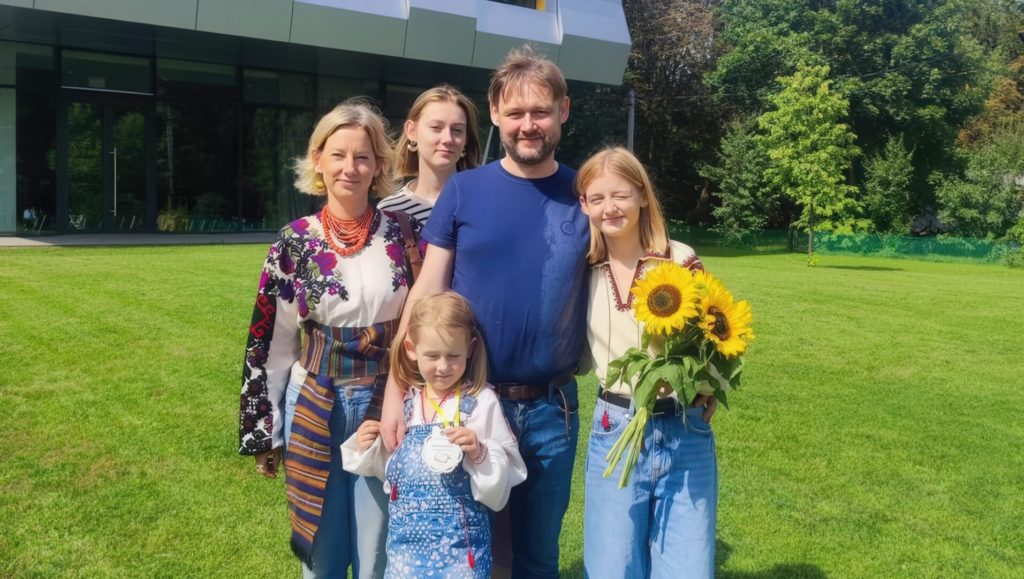Lviv mourned the victims of the Sept. 4 Russian strike on the residential buildings as thousands gathered Sept. 6 for funeral services of a mother and her three daughters.
People wiped away tears as four white coffins stood open in the Greek Catholic Garrison Church of the Holy Apostles Peter and Paul. Later a big crowd processed to the cemetery, where four white crosses were flooded with flowers.
A Ukrainian Catholic University student and all but one member of her immediate family were among those killed in a Sept. 4 strike by Russia on the western Ukrainian city of Lviv.
Seven residents died after Russia fired Kinzhal hypersonic missiles on targets in Lviv Sept. 4. Although Russia's defense ministry alleged it had aimed at military facilities, Lviv mayor Andriy Sadovy said the attack had hit more than 50 civilian buildings, including homes, schools and medical facilities.
Among the seven slain -- whose ages ranged from 7 to 55 -- were 18-year-old Daryna Bazylevych, called Daria by friends and family, a sophomore at Ukrainian Catholic University in Lviv; her mother, Evgenia; and her two sisters, Emilia and Yaryna, ages 7 and 21.
The family's father and sole survivor, Yaroslav, remained in critical condition. Photographs posted on X (formerly Twitter) by Ukraine's Center for Strategic Communication and Information Security and by the university showed him emerging from the rubble dazed and bloodied.
It was not clear whether Yaroslav would attend the Sept. 6 funeral as after the attack he was in intensive care. With wounds around his face, and helped by others to walk, he however participated, visibly in shock and despair. The funeral following the attack that had shaken Ukraine and the world was livestreamed.
"In the center of Europe, Russia is exterminating whole families of Ukrainians. The Russians are killing our children, our future," Lviv's Mayor Sadovy wrote in an online post.
UCU posted a tribute to Bazylevych that included a recent photo of the entire family gathered on the school's campus, with the student holding a bouquet of sunflowers, Ukraine's national flower.
"This is a great and irreparable loss. There are no words to describe this sorrow," said the university, describing Bazylevych as "a capable and gifted student" who had been awarded a scholarship.
Bazylevych was studying Ukraine's culture and history, which she wanted to "tell about ... to the world," said the university, quoting the young woman's scholarship application essay.
That passion grew as her "incredibly friendly and harmonious family" shared "stories of the ordeal our ancestors endured as a result of World Wars, the Holodomor (the starvation of millions of Ukrainians in 1932–33 as a result of Soviet policies) and the Soviet Union."
While calling for prayers "for the souls of the innocently murdered," the university also invited all to a Sept. 4 memorial liturgy at the school's church, St. Sophia of the Wisdom of God.
That same day, another UCU student was laid to rest, having been killed in action while battling invading Russian forces, university president Metropolitan Archbishop Borys A. Gudziak of the Ukrainian Catholic Archeparchy of Philadelphia said, speaking to OSV News in Odesa.
In May, first-year UCU student Iryna Myronenko and her 12-year-old daughter, Mariya, were killed in a Russian strike on a Kharkiv supermarket.
A number of UCU students have been killed since the start of Russia's February 2022 full-scale invasion of Ukraine, which continues attacks launched in 2014, and which has been declared declared a genocide in two joint reports from New Lines Institute and the Raoul Wallenberg Center for Human Rights.
Among the fallen are psychology graduate Oles-Yulian Shcherba and Artem Dymyd, an adventurer and business developer who had fought to defend Ukraine's sovereignty since 2014, when Russia illegally annexed Ukraine's Crimea region.
The university also called for prayers for the only survivor of the Bazylevych family in a Sept. 4 strike: "Let's pray for father Yaroslav," the UCU community said.
Lviv is a city located only 40 miles from the border with NATO-member Poland.
The attack so close to Poland prompted the government in Warsaw to scramble fighter jets to the Ukrainian border area.

